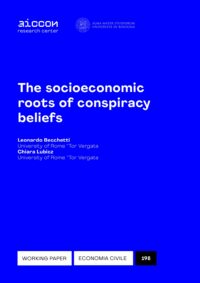198 – The socioeconomic roots of conspiracy beliefs
Leonardo Becchetti, University of Rome “Tor Vergata”*
Chiara Lubicz, University of Rome “Tor Vergata”
Abstract
Using the last wave of the European Social Survey we investigate factors associated with the formulation of conspiracy beliefs in 16 countries on three specific fields (politics, science, COVID-19).
We find that around one third of respondents agree or strongly agree with such beliefs and that low education and self-declared financial hardships are significantly and positively correlated with them.
Conspiracy believers express as expected lower trust toward parties and institutions, are less likely to vote and have stronger preferences for income redistribution.
Keywords: conspiracy beliefs, education, financial difficulties, income distribution.
JEL numbers: A13, A14.

